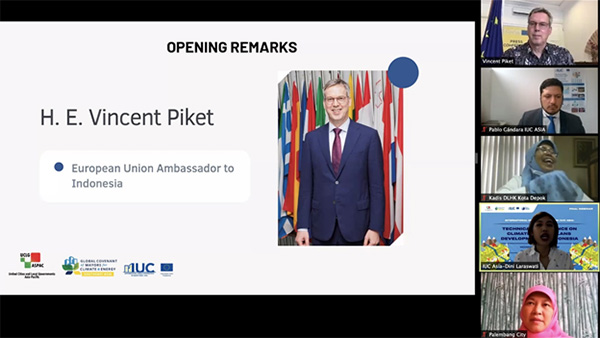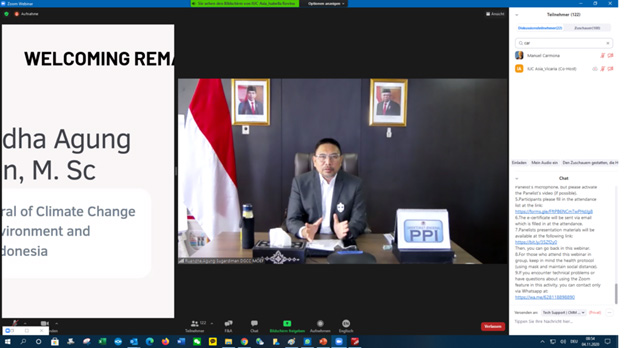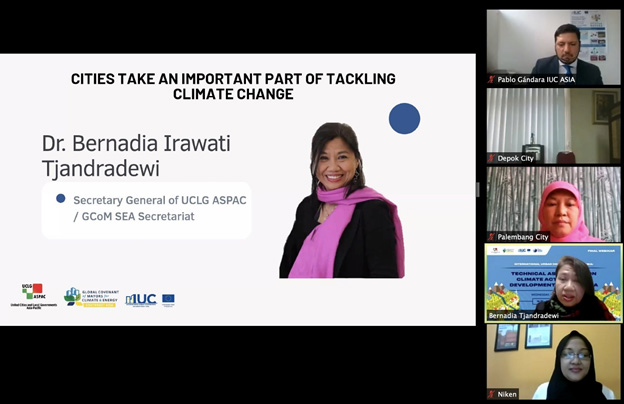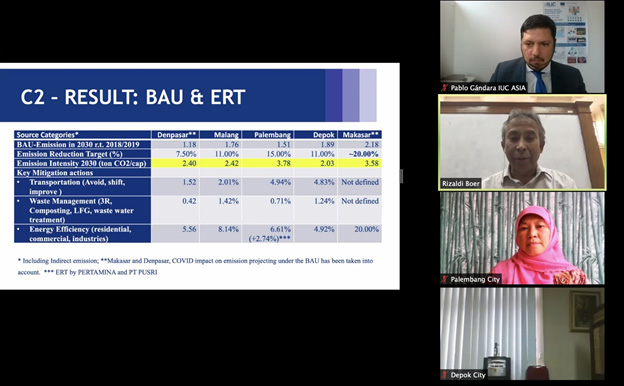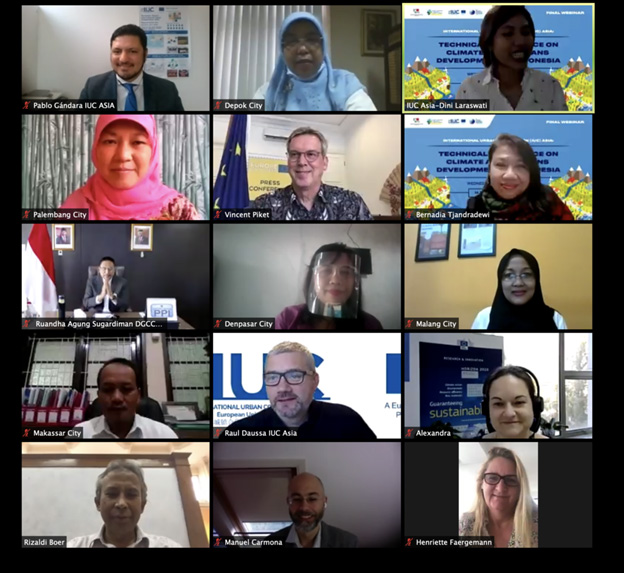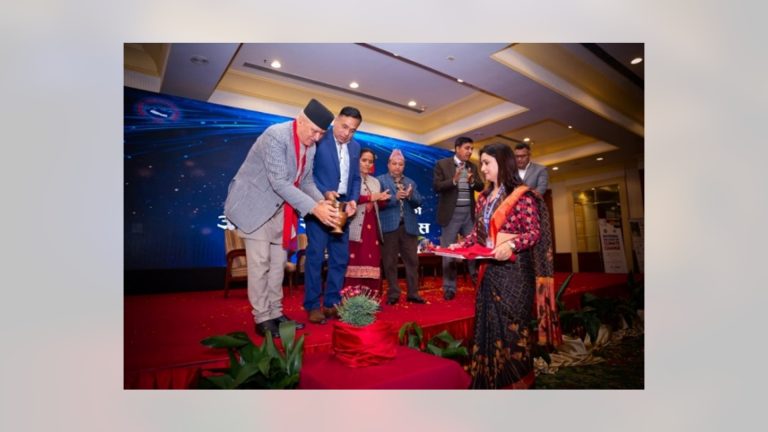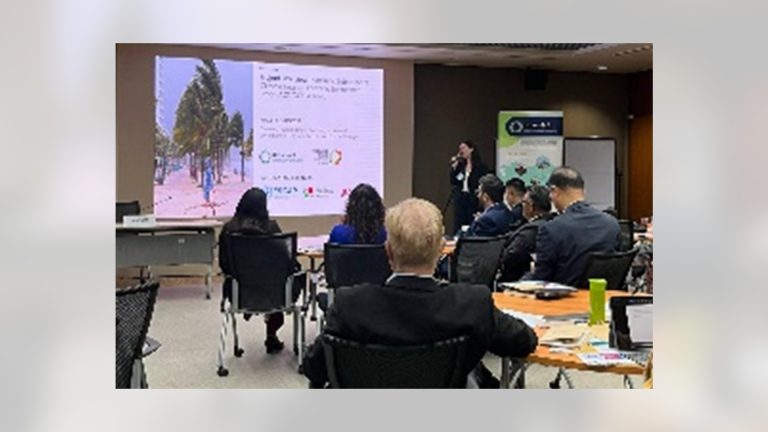4 November 2020 | UCLG ASPAC, under the framework of the International Urban Cooperation (IUC) Asia programme, had supported pilot cities in Indonesia, Malaysia, and Vietnam in the development of city’s Climate Action Plans (CAPs) according to the Global Covenant of Mayors’ Common Reporting Framework (GCoM CRF). Since 2019, the cities had received relevant knowledge transfers, capacity building, international networking, and technical assistance to enable them realise their climate commitment.
As IUC Asia programme is coming to an end in November 2020, the CAPs from pilot cities arrived at its completion. To showcase the developed CAPs, IUC Asia held final webinars for pilot cities in respective country. For cities in Indonesia, the final webinar was held on 4 November 2020, titled Technical Assistance on Climate-Action-Plans Development in Indonesia, and attended by more than 125 participants.
The event covered discussion on the so-called “final products” – the CAPs – and respective lessons learned during the process of developing them for the pilot cities of Palembang, Denpasar, Depok, Malang and Makassar. Also presented were results of a mid-term monitoring webinar, review of emerging needs and challenges for future EU cooperation policies.
The webinar was opened by H.E. Ambassador Vincent Piket, Head of the EU Delegation to Indonesia and Brunei Darussalam, and had the participation of the EU’s Foreign Policy Instrument (FPI), the EC Directorate-General for Climate Action (DG CLIMA) and the Ministry of Environment and Forestry of Indonesia (MoEF).
“I commend the task of our implementing partners, to be able to accomplish the objectives set in our project and I am looking forward to a continued cooperation and successful implementation of the climate action plans in the future,” said Ambassador Vincent Piket in his opening. He highlighted that the EU in Indonesia will continue to monitor the support provided in future programmes, mainly in the forthcoming project to support the GCoM in Asia. “The EU is at the forefront of the fight to avert the worse consequences of climate change, and its foreign policy is aligned with those objectives,” he added.
Further welcoming remarks were presented by Dr. Ir. Ruandha Agung Sugardiman, Director General of the Climate Change Department at the Ministry of Environment and Forestry of Indonesia. “This joint effort towards real action in controlling climate change….by sifting through information and exchanging experiences related to the implementation of the design of urban climate action plans, will help to provide the maximum benefit in mitigating the effects of climate change,” he stated.
Manuel Carmona Yebra, from DG CLIMA of the EU Commission, addressed Climate and Energy Cooperation as a Driver to Combat Global Challenges. Mr. Carmona laid out the strength of the European Green Deal, as a blueprint to align Europe with the Sustainable Development Goals and the Paris Agreement, aiming for Climate-neutrality by 2050. He welcomed Indonesia’s submission to the United Nations Framework Convention on Climate Change (UNFCCC) on adequacy and effectiveness of adaptation and support, while praising the good job of the five pilot cities in Indonesia, regarding plans that cover all aspects of climate action, including mitigation, adaptation and access to clean energy. He pointed out the need for sustainable finance, since public funds will never be sufficient to finance the green recovery and transition to a climate-neutral, resilient economy. The EU, in partnership with other countries, has established an International Platform on Sustainable Finance to enhance international cooperation, for which Indonesia became member this year.
Dr. Bernadia Irawati Tjandradewi, Secretary General of UCLG ASPAC (GCoM Southeast Asia Secretariat) presented the topic: Cities Take an Important Part of Tackling Climate Change and thanked the EU and the IUC partners for their effective work during the development of the Climate Action Plans. She stated, “COVID-19 highlights local governments role as front-line responders in crisis response, recovery, and rebuilding. It is important to ensure that cities are leading the way with green and resilient recovery plans.” Moving forward, she mentioned that the CAP will be the foundation of cities’ efforts in strategising Green and Resilient Recovery from COVID-19 pandemic. “UCLG ASPAC will continue to contribute to achieving urban climate resilience by promoting partnerships between local governments and other key actors,” she said as she ended her remarks.
In the main event, Dr. Rizaldi Boer (CCROM, IUC Asia’s technical partner in Indonesia) explained the climate action planning process, addressed the key results of the GHG baseline emissions inventories (BEIs) and the Risk Vulnerability Assessments (RVAs) – both produced with EU support. He addressed few challenges including data sharing and collection, staff discontinuity in cities, the cities’ limited technical capacity for climate monitoring, limited human resources and financial for upscaling the climate actions. He also referred to the strong commitment of the Indonesian pilot city governments, the intensive communication and consultation with city stakeholders, as well as to the pros and cons of online consultations within the COVID-19 context.
The Climate Action Plans (CAPs) were briefly addressed by representatives of the following pilot cities: Palembang, Denpasar, Depok, Malang and Makassar. They referred to the substance of the CAPs (challenges, targets and goals, actions) as well as to the process of their elaboration (stakeholders’ engagement, cross-sectoral cooperation) and to their expectations on the next steps. Cities representatives mentioned several lessons learned, including the added value of harmonising the national mitigation and adaptation platforms (SIGN SMART and SIDIK respectively) with the GCoM CRF, the importance of synchronising/integrating mitigation and adaptation actions into the city’s strategic development strategies, the need for international cooperation through technical training and the better understanding to climate change vulnerability through the CAP-making. They referred to several examples to raise awareness and engage with civil society.
Dr. Eleonora Lo Vullo from the EU Joint Research Centre (JRC) referred to the technical dialogue with the Indonesian technical partner CCROM to achieve coherence between the national reporting frameworks (SIDIK for adaptation and SIGN SMART for mitigation) and the GCoM’s CRF. She concluded that in order to make the mitigation platform SIGN SMART compatible with the CRF, a higher level of data disaggregation in transport and energy sectors is needed. Also, GHG reporting should be made compulsory for city level as well (so far it is still at provincial level). Indirect emission reporting should be included, for example, based on data deriving from the consumption of grid-supplied energy. She also mentioned that – in order to make SIDIK compatible with the CRF – more hazards should be included (so far only drought and flood). Also, the scale and unit of analysis for the adaptation framework needs to integrate cities and the regions surrounding them. Climate change impacts on a specific area/city can have repercussions (physical, social, economic) on surrounding areas. Therefore, an integrated approach that considers interfaces, surroundings and relations is necessary to build an adaptation strategy.
The session was concluded by a summary provided by IUC Asia Team Leader Pablo Gándara and Lead Expert Climate Raul Daussa.








